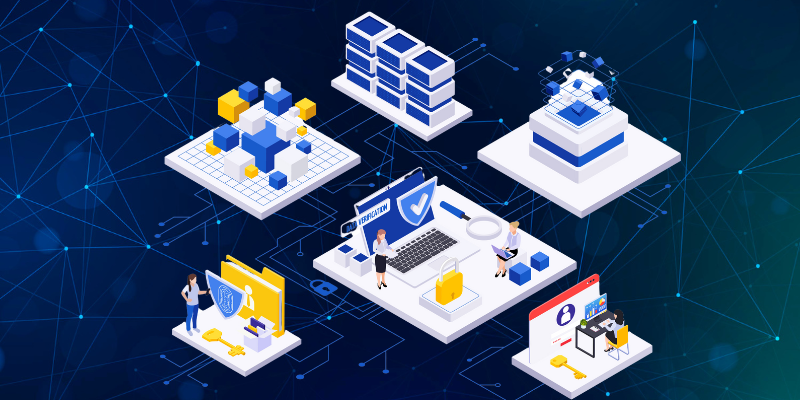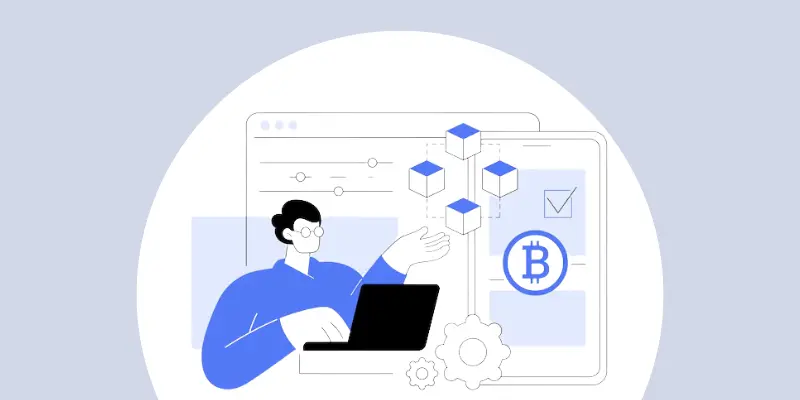Blockchain can be described as a decentralized technological advancement that permits safe transactions without central authority. It uses cryptography to secure and verify trades, making it a powerful option for businesses looking to increase security, transparency, and productivity.
Several steps involve using blockchain development solutions, design and testing, deployment, and maintenance. Here is a detailed explanation of each step
Design: Making the design is the first step to making blockchain a reality. Selecting a blockchain's private or public nature and its consensus algorithm for transaction validation is a crucial step during this process. The design process includes making a decision on the purpose of the blockchain as well as the information that will be stored within it.
The blockchain development services need to be created in the following step. The blockchain network has to be made, smart contracts have to be developed, and the nodes have to be able to communicate with each other. Although nodes verify transactions and ensure the integrity of the blockchain, smart contracts are utilized to automate transactions and ensure compliance with regulations.
Testing: Once the blockchain technology is in place, it is vital to test it thoroughly before putting it into service. This ensures that the blockchain is secure, efficient, reliable, and meets the needs of the business. This includes conducting various tests, such as security tests, stress tests, and functional tests.
Implementation: This blockchain technology has been set to be deployed after testing. This involves setting up the network's nodes and making the blockchain available to users. During installation, it is vital to ensure that the blockchain is correctly set up and that every node is synced.
Maintenance: After the implementation of blockchain development solutions, the system needs to be maintained and up-to-date. This involves checking for bugs or issues in the blockchain, re-updating the software when needed, and maintaining the blockchain's security and efficiency as time passes. Companies must adhere to certain best practices in using blockchain and these measures. They are:
There are many options for the ideal blockchain platform, each with its own advantages and drawbacks. It is crucial to choose the right platform for your specific use case.
Establishing a solid governance model: As the blockchain system is a decentralized technology, and no single person is responsible for enforcing rules, it is essential to develop an effective governance model that defines how blockchain is utilized and who will be granted access to it to ensure its safe and efficient use.
Security of the blockchain: While it is a highly secure technology, attacks are still feasible. Solid protection measures, including encryption and multi-factor authentication, are vital to ensure the blockchain's safety.
Scalability: To be scalable, the blockchain should handle the ever-growing demands as more users join. The possibility of scaling must be considered when creating the blockchain's design to ensure.
To calculate the costs accurately, it is essential to Hire Blockchain Developers who have experience designing and implementing solutions for blockchain. These experts can provide helpful information regarding the technical requirements and potential issues involved in implementing the blockchain system.
How Much Does It Cost To Build Your Cryptocurrency?
The cost of cryptocurrency creation is between $5k and $70k, based on the requirements of your business. Numerous factors affect the cost of creating a cryptocurrency, but the most significant is
-
-
Time for development.
-
The technology used in the construction process.
-
The team you employ to help you with the process of making your cryptocurrency.
-
Let's explore the differences between them and discover how we can save money by making use of the best platform available,
Scratch Development Process
-
-
Hire Blockchain Developers to develop an entirely new cryptocurrency from scratch is a time-consuming process that could make it more difficult.
-
-
-
The timeframes for development and delivery are not guaranteed.
-
-
-
Making your own cryptocurrency from scratch is about twice as much and comes with an additional fee.
-
Ready-made solutions
-
Hire Blockchain Developers that understand how to create your cryptocurrency, which will reduce the cost of hiring.
-
-
The pre-built solution is completely adjustable and adaptable. The development time is greatly decreased, and delivery time will be in line with the deadline.
-
-
-
You'll receive the entire source.
-
-
-
The tech support will provide you with amiable assistance!
-
-
-
Additionally, the pricing plans are less expensive than designing them from scratch. It's your turn to select the one that is right for you!
-
Factors Affecting the Cost of Building Blockchain App
Here are a few elements that influence the price of blockchain development services:
-
-
The size of the App Development Agency is small: Smaller companies are much less than medium—and large-size businesses. Building a portfolio of work requires a lot of time. However, large corporations have an expensive cost estimate for various reasons, including the desire to maintain an inventory of essential portfolios.
-
-
-
Cost of the App Based on Industry: The sector that the dApp is going to be part of will affect the price of app development. There are numerous cost-producing factors, such as the complex nature of the dAppand, the number of stakeholders involved in the dApp, industry-specific compliances, etc.
-
-
-
Complexity of Blockchain Application Complexity of Blockchain App: Many elements are responsible for the complexity of the Blockchain application. A few of them are consensus mechanisms and blockchain platforms. Tools and programming languages APIs to develop apps, UX/UI, and more. The first aspect to think about here is to identify and comprehend the blockchain application's goal. It is crucial to be aware of what's being created as well as the existing solutions, how the apps could offer better services and the significance of investing in the development of blockchain apps. These aspects and questions must be considered to determine the price of developing a blockchain-based app.
-
-
-
Storage costs are high: There are millions of choices for storage, and they can be insecure. Storage costs are the price of the amount of space required for the storage device for storing the blockchain information. It can range from 30 GB to 1TB of storage space. This may seem like lots of space; however, this will contain the wallet and every transaction via the blockchain. The primary issue with the storage of the hard disk is that unless backups are stored off-site, there is the risk of losing everything when crashes occur. It is essential to calculate the cost of storage for a Blockchain Development Company since it can impact the development costs as well. The app must be able to handle at least a certain number of users.
-
-
-
Number of Transactions: The number of transactions is likely the most vital factor in determining the size of a blockchain. The more transactions occur, the more data is required to be saved within the system. If there are lots of people using the app every day, this results in an extremely fast and huge size of the blockchain. Therefore, a precise estimate of the number of people using it and the possible number of transactions each day can help determine the price of a blockchain application.
-
-
-
Type of Blockchain Used: The type of blockchain used is based on the features required to provide certain features within the blockchain development services. If a blockchain application is a marketplace, and Ethereum is used to make payments and transactions, then Ethereum may have a major impact on the price. The same is true for various GAS rates at various nodes.
-
Blockchain App Classification: The blockchain app can come in two varieties:
-
-
Cryptocurrency-Based app: The applications are built upon cryptocurrency wallets, dApps, ICOs with dApp solutions, and so on. The cost of these applications is higher because of the cryptocurrency's involvement and the ability to create an arrangement for wallets.
-
Non-Cryptocurrency-Based app: These apps are independent of cryptocurrencies, based on distributed ledger systems, and highly used in Inventory management systems. Thus, they are less complex but still incur costs due to the high use of necessary storage solutions.
-
Utilization of Smart Contracts: Smart contracts allow DApps to connect to blockchain systems. The expense of developing smart contracts increases the cost of developing apps.
The Nature of the Blockchain Network
Choosing between the public and private blockchain network significantly impacts the costs of blockchain development services. Private blockchains require an authoritative central authority each time they make any transaction, which increases the cost of blockchain apps. The public blockchain, however, is entirely non-permissible, meaning anyone can participate in the consensus process. Thus, the price is lower when compared to the private blockchain.
Decentralization Degree: The degree of decentralization is low, the process is simple, and the application is less costly. Implementing a higher level of decentralization can be more complex and expensive.
Determine the Cost of Blockchain Implementation
Estimating the costs associated with implementing blockchain-related projects is challenging because many factors could impact the final price. However, the following are a few of the most essential aspects that can help evaluate the cost of blockchain development solutions implementation.
Various types of blockchain, such as private, public, and consortium models, each with a unique implementation cost, are available. Public blockchains such as Bitcoin and Ethereum are available to everyone; however, they have higher implementation costs because they require a large amount of computing power to operate their networks. In contrast, private blockchains are designed for a specific business, may require fewer computing resources, and will reduce the installation cost.
The complexity of the Project: The cost of implementation could vary depending on the complexity of the project. Projects with multiple points of entry, intelligent contracts, and sophisticated features such as security and privacy may incur more expensive implementation costs.
Tools and Platforms: The cost of implementation is also influenced by the platform and tool choice. For example, an open-source platform such as Hyperledger Fabric could require less money to start a blockchain project than a private platform requiring license fees.
Team for Development: The cost of the team could vary depending on where they're situated, how skilled they are, and what they can do. The cost of implementation might be higher if you employ an expert team with extensive expertise in blockchain development services.
Infrastructure Costs: The infrastructure costs will affect the development costs for a blockchain project. These include the price of the network, storage, and server hardware, as well as the cost of cooling and power.
Support and maintenance are the most important elements in any blockchain project, and the cost of these services must be considered when calculating the installation costs.
Compliance With Regulations: Depending on the region or country in which the blockchain development solutions will be implemented, legal requirements may need to be adhered to, such as KYC/AML compliance or laws regarding data protection. These rules may affect the cost of implementation.
It is essential to consider all of the above aspects and formulate a detailed plan of action with a budget to estimate the cost of implementation for a blockchain-related project. The time frame for the project's completion must be incorporated into the plan of work, as well as an estimate of costs for each project element that includes construction infrastructure, maintenance, and construction. To consider any unexpected expenses or delays encountered during the implementation phase, you must consist of an emergency plan.
Conclusion
Web development teams, Analysis verticals feature integration, and many more are all part of the cost of developing or implementing blockchain technology.
These elements provide an outline of the spectrum of costs involved in blockchain development solutions. An accurate estimate of the expense of developing or implementing any blockchain-related app is essential. The app's use cases, complexity, and approach will all influence the final price.
Although it's hard to estimate the exact costs associated with Ethereum or Bitcoin app development, based on your project's requirements, the typical cost is between $5k and $500k. For more accurate estimates, you should discuss the security and scope needs of your blockchain app. You could also connect the API to your blockchain application.
The conclusion is that you can Hire Blockchain Developers or an expert company to develop blockchain-based apps is an efficient method of speeding up the process of developing apps compared to other alternatives (in-house or outsourcing).













Share this blog